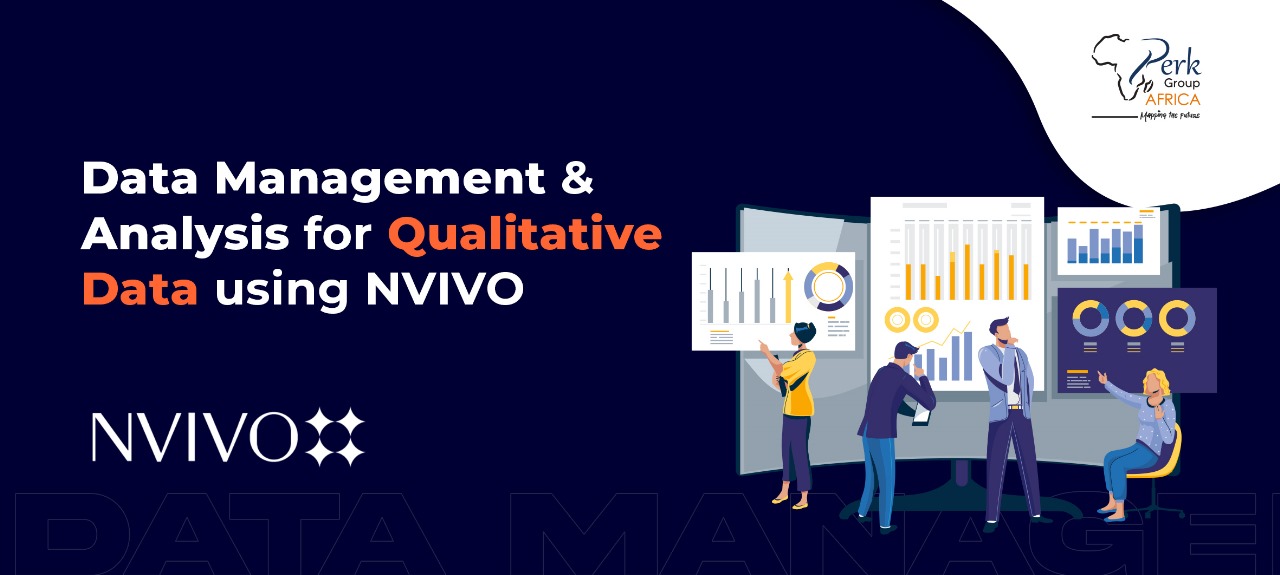
Training Course on Data Management and Analysis for Qualitative Data using NVivo
Course Overview
The Data Management and Analysis for Qualitative Data using NVivo is designed to empower participants with the skills required for effective qualitative data management and analysis using NVivo. NVivo is a robust software widely utilized in qualitative research. Through hands-on sessions, participants will navigate the software, import diverse data types, code, and perform advanced analyses to draw meaningful insights. The course covers fundamental and advanced features, ensuring participants gain proficiency in leveraging NVivo for qualitative research.
Course Duration: 5 days
Course Outline
Module 1: Introduction to Qualitative Research
- What is qualitative research?
- Dimensions of qualitative methods
- Qualitative research approaches
- Qualitative data collection methods
- Qualitative research study design
Module 2: Preliminaries of Qualitative data Analysis
- What is qualitative data analysis
- Approaches in Qualitative data analysis; deductive and inductive approach
- Points of focus in analysis of text data
- Principles of Qualitative data analysis
- Process of Qualitative data analysis
Module 3: Introduction to NVIVO and NVIVO Projects
- NVIVO Key terms
- NVIVO interface
- NVIVO workspace
- Use of NVIVO ribbons
- Creating new projects
- Merging, importing and exporting projects
- Managing projects
- Working with different data sources
Module 4: Nodes and Classifications in NVIVO
- Theme codes
- Case nodes
- Relationships nodes
- Node matrices
- Source classifications
- Case classifications
- Node classifications
Module 5: Coding
- Data-driven vs theory-driven coding
- Analytic coding
- Descriptive coding
- Thematic coding
- Tree coding
Module 6: Thematic Analysis using NVIVO
- Organize, store and retrieve data
- Cluster sources based on the words they contain
- Text searches and word counts through word frequency queries.
- Examine themes and structure in your content
Module 7: Memos Annotations and Links
- Linked memos
- Adding annotation to selected content
- See also link
Queries using NVIVO
- Queries for textual analysis
- Queries for exploring coding
Module 8: Building on the Analysis and Interpretation
- Content Analysis; Descriptive, interpretative
- Narrative Analysis
- Discourse Analysis
- Grounded Theory
- Comparing analysis results with research questions
- Summarizing finding under major categories
- Drawing conclusions and lessons learned
Module 9: Visualizing NVIVO project
- Display data in charts
- Creating models and graphs to visualize connections
- Tree maps and cluster analysis diagrams
Module 10: Triangulation of Data Sources
- Triangulating with quantitative data
- Using different participatory techniques to measure the same indicator
- Comparing analysis from different data sources
- Checking the consistency on respondent on similar topic
Module 11: Qualitative Report Writing
- Qualitative report format
- Reporting qualitative research
- Reporting content
- Interpretation
Note: This outline provides a general structure for the training. The specific content, activities, and duration of each session may be adjusted based on the target audience, learning objectives, and available time.
Classroom Training Schedule
| Start Date | End Date | Location | Cost | Apply |
|---|---|---|---|---|
| Jun 23, 2025 | Jun 27, 2025 | Nairobi | $ 1050 | Register |
| Jul 28, 2025 | Aug 01, 2025 | Nairobi | $ 1050 | Register |
| Sep 01, 2025 | Sep 05, 2025 | Nairobi | $ 1050 | Register |
| Oct 06, 2025 | Oct 10, 2025 | Nairobi | $ 1050 | Register |
| Nov 10, 2025 | Nov 14, 2025 | Nairobi | $ 1050 | Register |
| Dec 15, 2025 | Dec 19, 2025 | Nairobi | $ 1050 | Register |
Virtual Training Schedule
| Start Date | End Date | Location | Cost | Apply | |||
|---|---|---|---|---|---|---|---|
| Jun 09, 2025 | Jun 13, 2025 | Online | $ 400 | Register | |||
| Jul 14, 2025 | Jul 18, 2025 | Online | $ 400 | Register | |||
| Aug 18, 2025 | Aug 22, 2025 | Online | $ 400 | Register | |||
| Sep 22, 2025 | Sep 26, 2025 | Online | $ 400 | Register | |||
| Oct 27, 2025 | Oct 31, 2025 | Online | $ 400 | Register | |||
| Dec 01, 2025 | Dec 05, 2025 | Online | $ 400 | Register |
Course Language
This Training course is offered in ENGLISH . Please indicate the language of choice during registration.
Course Delivery
Presentations are well guided, practical exercise, a plenary presentation, and group work. Participants are encouraged to bring any data relevant to their job responsibilities. This is hands-on, product-oriented training and will mostly involve practical exercises. Each participant MUST bring along their own working laptop and android phone.
Certification
Upon completion of training, the participant will be issued with a certificate of Completion.
Tailor-Made Course
3 months post-training support, consultation, and coaching is a guarantee from us and will be available after the course.We can also do this as a tailor-made course to meet organization-wide needs. Contact us to find out more: training@perk-gafrica.com.
